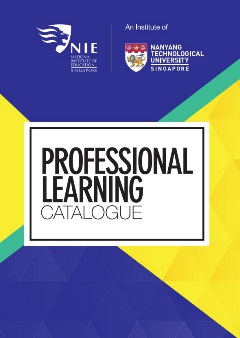Certificate in Differentiating Curriculum and Instruction for High Ability Learners
Overview
This certificate programme seeks to provide teachers from independent schools as well as those working in various educational settings with further professional development opportunities to enhance their knowledge and skills in meeting the needs of learners who have been identified as high ability learners (HAL). This programme is targeted at a wide range of educators, from those working in the early childhood sector to those in institutions of higher learning to facilitate and develop a continuum of educational support for HALs.
This certificate programme seeks to develop the participants’ professional competence and expertise in providing support for high ability learners. It aims to achieve the following objectives:
- equip educators with evidence-based knowledge and understanding of the affective and learning needs of high ability learners
- apply the knowledge and skills in the planning and implementation of differentiated units of instruction in the classroom that can engage and develop learners with high ability;
- enhance educators’ understanding of school-wide and collaborative practices that can influence and affect the learning and development of identified learners with high ability (e.g. exploring existing supports offered by the Gifted Education Branch, Ministry of Education and community-based organisations that support the development of talent);
- collaborate with other educators to develop a community of professionals who are committed to supporting the development of the learners with high ability.
This certificate programme is for educators who meet the following entry requirements:
- a degree (for educators without a degree, applications will be reviewed on a case-by-case basis), and
- a minimum of two years of teaching experience.
* For applicants who do not have a degree, the NIE will review and select the applicants based on the following criteria:
- Educators must have at least a Diploma in Education and experience teaching high ability learners;
- A strong letter of support from his/her Principal.
This Certificate consists of three courses totaling 10 academic units (AUs) which is equivalent to 130 hours. Courses will be offered over three semesters.
| Course Code | Title | No. of AUs |
|---|---|---|
| IEC6011* | Understanding Learners with High Ability and their Affective and Moral Needs | 4 |
| IEC6013* | Differentiating Curriculum and Pedagogies for Learners with High Ability | 4 |
| IEC4043 | Practicum in Teaching Learners with High Ability | 2 |
*Both IEC6011 and IEC6013 will be cross-coded with MHA901 and MHA903, respectively.
For its course description, please see below.
| Course | Description |
| IEC6011 Understanding Learners with High Ability and their Affective and Moral Needs | This course focuses on the nature of learners with high ability, and on how their instructional needs are qualitatively different from other learners in a typical classroom. Their development, their traits and needs will be discussed in
terms of intellectual, emotional, moral, creative, social and behavioural characteristics. The course will emphasise general theories of intelligence and on how these apply to high ability learners. It will introduce different conceptions
of high ability and map the approaches to identification and programming from the past to present times. It will raise participants’ awareness of issues pertinent to understanding and meeting the needs of high ability learners. This course is eligible for credit transfer into MHA901 in the Masters of Education (High Ability Studies). |
| IEC6013 Differentiating Curriculum and Pedagogies for Learners with High Ability | The learner is at the core of the teaching and learning process, and effective teaching and learning requires a renewed focus on the unique needs of the learner and an understanding of differentiated curricula and pedagogies to meet these
needs. This course aims to help educators understand models for curriculum design, development and differentiation. It offers systematic knowledge and skills to develop appropriate curricula and instructional approaches to accommodate
learners with high ability. The course also offers a hands-on approach for participants to design and modify concept-oriented and inter-disciplinary units in Mathematics, Languages, Humanities and the Sciences using the frameworks
shared in the course. It also offers opportunities for participants to experiment with specific pedagogies shared in the course and develop insights into how best to use them in diverse contexts. This course is eligible for credit transfer into MHA903 in the Masters of Education (High Ability Studies). |
| IEC4043 Practicum in Teaching Learners with High Ability | This course focuses on the application of appropriate instructional strategies for enhancing the learning of high ability learners. It will involve the design and execution of a unit of instruction with at least 3 differentiated lessons and related reflections. Participants will receive guidance in making provisions for high ability learners via their appointed Developmental Supervisor (DS). There will be two lesson observations on the implementation of provisions developed in consultation with the DS. Participants will also receive developmental feedback during both the lesson planning and the implementation process. A professional conversation will also be carried out at the end of the practicum to help participants unpack and discuss issues with one other peer. By the end of the course, participants will have built a professional learning community that is intent on identifying and implementing appropriate instructional practices for high ability learners. |
Application is through PLaCE.
For enquiry on course administration, please e-mail: [email protected].














/enri-thumbnails/careeropportunities1f0caf1c-a12d-479c-be7c-3c04e085c617.tmb-mega-menu.jpg?Culture=en&sfvrsn=d7261e3b_1)

/cradle-thumbnails/research-capabilities1516d0ba63aa44f0b4ee77a8c05263b2.tmb-mega-menu.jpg?Culture=en&sfvrsn=1bc94f8_1)

